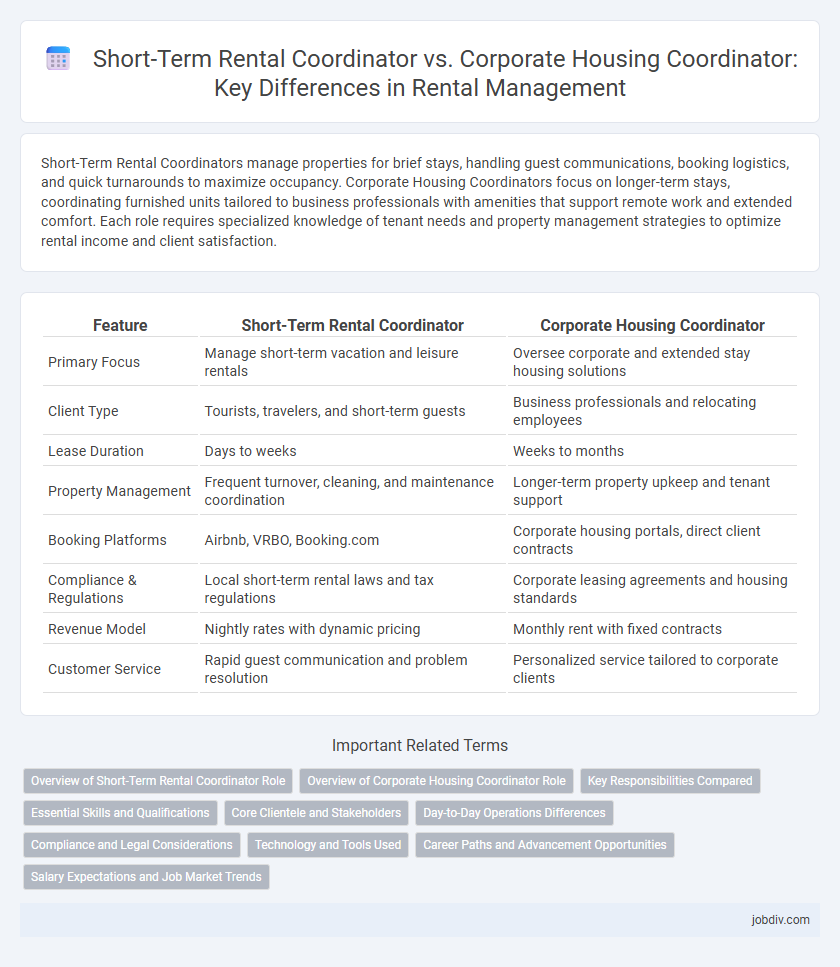Short-Term Rental Coordinators manage properties for brief stays, handling guest communications, booking logistics, and quick turnarounds to maximize occupancy. Corporate Housing Coordinators focus on longer-term stays, coordinating furnished units tailored to business professionals with amenities that support remote work and extended comfort. Each role requires specialized knowledge of tenant needs and property management strategies to optimize rental income and client satisfaction.
Table of Comparison
| Feature | Short-Term Rental Coordinator | Corporate Housing Coordinator |
|---|---|---|
| Primary Focus | Manage short-term vacation and leisure rentals | Oversee corporate and extended stay housing solutions |
| Client Type | Tourists, travelers, and short-term guests | Business professionals and relocating employees |
| Lease Duration | Days to weeks | Weeks to months |
| Property Management | Frequent turnover, cleaning, and maintenance coordination | Longer-term property upkeep and tenant support |
| Booking Platforms | Airbnb, VRBO, Booking.com | Corporate housing portals, direct client contracts |
| Compliance & Regulations | Local short-term rental laws and tax regulations | Corporate leasing agreements and housing standards |
| Revenue Model | Nightly rates with dynamic pricing | Monthly rent with fixed contracts |
| Customer Service | Rapid guest communication and problem resolution | Personalized service tailored to corporate clients |
Overview of Short-Term Rental Coordinator Role
A Short-Term Rental Coordinator manages day-to-day operations of rental properties with stays typically lasting from a few days to a few weeks, focusing on guest communication, booking management, and property readiness. This role requires expertise in platforms like Airbnb and VRBO, ensuring high occupancy rates and positive guest experiences. Proficiency in local regulations, cleaning scheduling, and maintenance coordination is essential to optimize short-term rental performance.
Overview of Corporate Housing Coordinator Role
Corporate Housing Coordinators manage furnished, temporary housing solutions for business travelers, overseeing lease agreements, maintenance, and tenant relations. They collaborate with corporate clients to tailor housing options that suit employee relocation or project needs. Expertise in contract negotiation and logistics ensures seamless housing transitions within shorter rental periods.
Key Responsibilities Compared
Short-Term Rental Coordinators manage property listings, guest communications, and turnover logistics to ensure seamless stays and maximize occupancy rates. Corporate Housing Coordinators specialize in longer-term leases, handling corporate client relations, lease agreements, and tailored housing solutions for relocating employees. Both roles require strong organizational skills, but short-term focuses on rapid guest turnover while corporate housing emphasizes personalized service and contract management.
Essential Skills and Qualifications
A Short-Term Rental Coordinator must excel in guest relations, property marketing, and rapid turnover management, with strong skills in CRM software and local regulatory compliance. A Corporate Housing Coordinator requires expertise in contract negotiation, client account management, and tailored housing solutions, emphasizing proficiency in corporate travel policies and billing systems. Both roles demand exceptional organizational abilities, problem-solving skills, and effective communication to ensure seamless tenant experiences and operational efficiency.
Core Clientele and Stakeholders
Short-Term Rental Coordinators primarily serve tourists, travelers, and temporary visitors seeking flexible, short-duration accommodations, managing relationships with property owners and online booking platforms. Corporate Housing Coordinators focus on business professionals, relocating employees, and companies requiring extended stays, coordinating with corporate clients, relocation agencies, and housing providers. Both roles demand strong communication with property managers and clients but differ significantly in their core clientele and stakeholder engagement.
Day-to-Day Operations Differences
Short-term rental coordinators manage frequent guest turnovers, handling tasks like check-ins, cleaning schedules, and maintenance requests with rapid responsiveness to ensure seamless guest experiences. Corporate housing coordinators focus on longer-term stays, coordinating lease agreements, customized billing, and tenant support services tailored for business travelers or relocating employees. The short-term role demands agility in daily operations, while corporate housing emphasizes contract management and sustained tenant relationship oversight.
Compliance and Legal Considerations
Short-term rental coordinators prioritize adherence to local zoning laws, transient occupancy taxes, and short-term licensing requirements to ensure legal compliance. Corporate housing coordinators focus on longer lease agreements, tenant rights, and fair housing laws, requiring thorough contract management to mitigate liability risks. Both roles necessitate constant monitoring of regulatory changes to uphold compliance and avoid penalties.
Technology and Tools Used
Short-term rental coordinators leverage platforms like Airbnb, Vrbo, and dynamic pricing tools such as Beyond Pricing to manage bookings and optimize occupancy rates efficiently. Corporate housing coordinators utilize specialized software like AppFolio and Yardi to handle long-term leases, detailed tenant communication, and compliance tracking tailored to corporate clients. Both roles rely heavily on property management systems (PMS) and customer relationship management (CRM) tools, but their choice of technology reflects their distinct rental durations and client needs.
Career Paths and Advancement Opportunities
Short-term rental coordinators typically gain extensive experience in guest relations, property management, and rapid turnover processes, which can lead to advancement into regional management or vacation rental portfolio roles. Corporate housing coordinators develop expertise in leasing agreements, client relationship management, and long-term strategic planning, often progressing toward senior roles in corporate housing operations or real estate account management. Both career paths offer opportunities for specialization and upward mobility within property management firms, hospitality companies, or real estate services.
Salary Expectations and Job Market Trends
Short-term rental coordinators typically earn between $40,000 and $60,000 annually, driven by high demand in vacation hotspots and fluctuating seasonal markets. Corporate housing coordinators command higher salaries ranging from $55,000 to $75,000, reflecting the stable, long-term leasing contracts favored by business clients. Job market trends indicate growing opportunities in corporate housing due to increasing business travel, while short-term rental roles face more competition and variability linked to tourism cycles.
Short-Term Rental Coordinator vs Corporate Housing Coordinator Infographic

 jobdiv.com
jobdiv.com